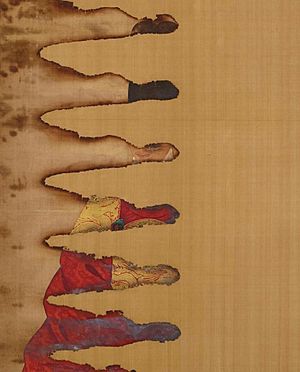Sunjo of Joseon facts for kids
Quick facts for kids Sunjo of Joseon朝鮮純祖 조선 순조 |
|
|---|---|
 |
|
| King of Joseon | |
| Reign | 1800–1834 |
| Predecessor | Jeongjo of Joseon |
| Successor | Heonjong of Joseon |
| Born | 29 July 1790 |
| Died | 13 December 1834 (aged 44) |
| Burial | Illeung, Seoul, Korea |
| Spouse | Queen Sunwon |
| Issue | Crown Prince Hyomyeong An unknown Prince Princess Myeongon Princess Bokon Princess Deokon Princess Yeongon |
| House | House of Yi |
| Father | King Jeongjo of Joseon |
| Mother | Royal Noble Consort Su |
| Signature |  |
| Sunjo of Joseon | |
| Hangul |
순조
|
|---|---|
| Hanja |
純祖
|
| Revised Romanization | Sunjo |
| McCune–Reischauer | Sunjo |
| Birth name | |
| Hangul |
이공
|
| Hanja |
李玜
|
| Revised Romanization | I Gong |
| McCune–Reischauer | Ri Kong |
Sunjo of Joseon (29 July 1790 – 13 December 1834, reigned 1800–1834) was the 23rd king of the Korean Joseon Dynasty. He was born with the title of His Royal Highness Prince Yi Gong. Sunjo was the 2nd son of King Jeongjo which King Jeongjo had with Lady Subin, one of King Jeongjo's concubines.
Contents
Biography
Sunjo ascended to the throne at age 10 in 1800 upon the death of his father, King Jeongjo.
In 1802, King Sunjo married Lady Kim of Andong, known posthumously as Queen Sunwon, daughter of Kim Jo-sun who was a leader of Andong Kim clan.
Since he ascended the throne at a young age, Queen Dowager Jeongsun, the second queen of King Yeongjo, ruled as queen regent, which allowed her to wield power over state affairs. Despite King Sunjo's efforts to reform politics, the fundamental principles of government deteriorated. The state examination became disordered and corruption in the government personnel administration prevailed. This resulted in disorder in society and various riots broke out among the people, including the revolt by Hong Gyeong-nae in 1811–1812. The Ogajaktongbeop (五家作統法), a census registration system to group five houses as one unit, was carried out in this period, and oppression against Roman Catholicism began in earnest.
King Sunjo died after reigning for 35 years in 1834 at the age of 44. He was first buried next to Jangneung, Paju, the tomb of King Injo and Queen Inyeo but later moved to Illeung, Seoul as the Feng Shui at the old site was deemed to be unfavourable.
Family
- Father: King Jeongjo of Joseon (28 October 1752 – 18 August 1800) (조선 정조)
- Grandfather: King Jangjo of Joseon (13 February 1735 – 12 July 1762) (조선 장조)
- Grandmother: Queen Heongyeong of the Pungsan Hong clan (6 August 1735 – 13 January 1816) (헌경왕후 홍씨)
- Mother: Royal Noble Consort Su of the Bannam Park clan (8 May 1770 – 26 December 1822) (수빈 박씨)
- Grandfather: Park Jun-won (1739 – 1807) (박준원)
- Grandmother: Lady Won of the Wonju Won clan (1740 – 1783) (부인 원주 원씨)
- Consorts and their Respective Issue(s):
- Queen Sunwon of the Andong Kim clan (순원 왕후 안동 김씨; 1789 – 1857)
- Yi Yeong, Crown Prince Hyomyeong (이영 효명세자; 1809 – 1830), first son
- Princess Myeongon (명온 공주; 1810 – 1832), first daughter
- Princess Bokon (복온 공주; 1818 – 1832), third daughter
- Second son (대군; 1820 – 1820)
- Princess Deokon (덕온공주; 1822 – 1844), fourth daughter
- Yi Byeon, Prince Deokwan (이변 덕완군; 1831–1863), adoptive (third) son
- Royal Consort Sug-ui of the Miryang Park clan (숙의 밀양 박씨; d. 1854)
- Princess Yeongon (영온옹주; 1817 – 1829), second daughter
- Queen Sunwon of the Andong Kim clan (순원 왕후 안동 김씨; 1789 – 1857)
His full posthumous name
King Sunjo has the 2nd longest posthumous name for an emperor of Korea.
- English: King Sunjo Seongak Yeondeok Hyeondo Gyeongin Sunhui Cheseong Eungmyeong Heumgwang Seokgyeong Gyecheon Baegeuk Yungwon Donhyu Euihaeng Soyun Huihwa Junryeol Daejung Jijeong Honghun Cheolmo Geonsi Taehyeong Changun Honggi Gomyeong Bakhu Ganggeon Sujeong Gyetong Suryeok Gongyu Beommun Anmu Jeongryeong Gyeongseong-hyo the Great of Korea
- Hangul: 순조선각연덕현도경인순희체성응명흠광석경계천배극융원돈휴의행소윤희화준렬대중지정홍훈철모건시태형창운홍기고명박후강건수정계통수력공유범문안무정령경성효대왕
- Hanja: 純祖先覺淵德顯道景仁純禧體聖凝命欽光錫慶繼天配極隆元敦休懿行昭倫熙化峻烈大中至正洪勳哲謨乾始泰亨昌運弘基高明博厚剛健粹精啓統垂曆建功裕範文安武靖英敬成孝肅皇帝
See also
 In Spanish: Sunjo para niños
In Spanish: Sunjo para niños

